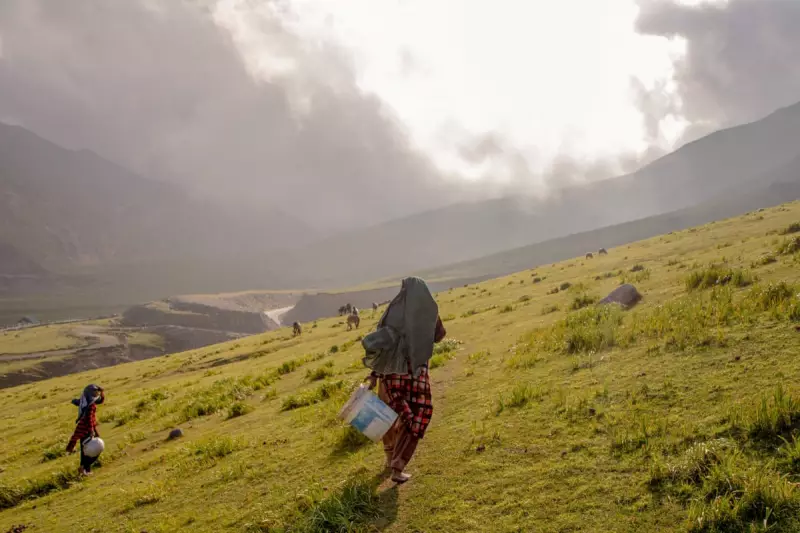
High in the Himalayan mountains of Indian-administered Kashmir, a silent healthcare emergency is unfolding among nomadic pastoralist communities. Women from the Gujjar and Bakarwal tribes are facing childbirth completely alone, without any medical assistance, at altitudes reaching 14,000 feet.
Life and Death in the High Mountains
The Guardian's investigation reveals a stark reality: maternal mortality rates in these remote mountain communities remain critically high, with women often giving birth in makeshift shelters or open pastures during their seasonal migrations. These nomadic families move their livestock between highland and lowland pastures twice yearly, following ancient routes that take them far from any healthcare facilities.
One woman, Shareefa, recounted her experience of giving birth entirely alone while her husband was away with their livestock. "I was terrified," she shared. "There was no one to help me, no medicine, no clean cloth. I thought I would die there with my baby." Her story is not unique but represents the daily reality for countless women in these communities.
Healthcare System Failures
The structural barriers preventing these women from accessing care are numerous and complex. Mobile medical units rarely reach the highest pastures, and when they do, they often lack the necessary equipment or trained staff to handle childbirth complications. Many women cannot access the government's conditional cash transfer schemes designed to encourage institutional deliveries because they cannot reach the designated health facilities.
Healthcare workers describe an almost impossible situation. Dr. Sajad Ahmed, who works with a mobile medical unit, explained: "By the time we hear about a woman in labour and reach her location, it might be too late. The distances are enormous, the terrain is treacherous, and we simply don't have enough resources to cover all the migratory routes."
The data reveals alarming disparities. While India has made significant progress in reducing maternal mortality nationally, with the rate dropping to 97 deaths per 100,000 live births according to recent figures, these mountain communities are being left behind. Exact statistics for the Gujjar-Bakarwal population are difficult to obtain, but local health workers estimate the rates are substantially higher than national averages.
Cultural and Logistical Barriers
Cultural practices and logistical challenges create additional complications. Many families prefer traditional birth attendants, but these practitioners are becoming increasingly rare. Meanwhile, the journey to the nearest health facility can take days, requiring travel on foot or by donkey over some of the world's most challenging terrain.
Zareena, a 28-year-old mother of three, described her eight-hour journey while in labour: "I was in so much pain, but we had to keep moving. We couldn't afford to stop because the hospital was still so far away. I prayed we would make it in time."
The situation is particularly dire for adolescent mothers, who face higher risks during pregnancy and childbirth. Early marriage remains common in these communities, and young mothers often lack knowledge about pregnancy care and danger signs.
Potential Solutions and Community Response
Local organizations are attempting to bridge the healthcare gap through innovative approaches. Some are training community health volunteers from within the Gujjar-Bakarwal communities themselves. These volunteers accompany the migrations, carrying basic medical supplies and providing crucial health information.
An initiative led by the Jammu and Kashmir health department has established seasonal health camps along migratory routes. However, workers report that these efforts remain insufficient due to funding constraints and the vast territory that needs coverage.
Advocates argue that solutions must be tailored to the nomadic lifestyle rather than expecting communities to abandon their traditional practices. Suggested interventions include:
- Mobile clinics specifically designed for mountain terrain
- Training programmes for community birth attendants
- Portable ultrasound and testing equipment
- Emergency transport systems using horses or drones
- Culturally sensitive health education programmes
As climate change alters weather patterns and affects traditional grazing lands, the challenges facing these communities are likely to intensify. The healthcare crisis in Kashmir's high mountains represents not just a failure of medical infrastructure but a broader question of how to preserve cultural traditions while ensuring fundamental human rights.
The women of the Gujjar and Bakarwal communities continue their seasonal migrations, caught between ancient traditions and modern healthcare gaps. Until systemic changes address their unique circumstances, many will continue to face childbirth alone in the high Himalayas, hoping both mother and child survive the experience.





